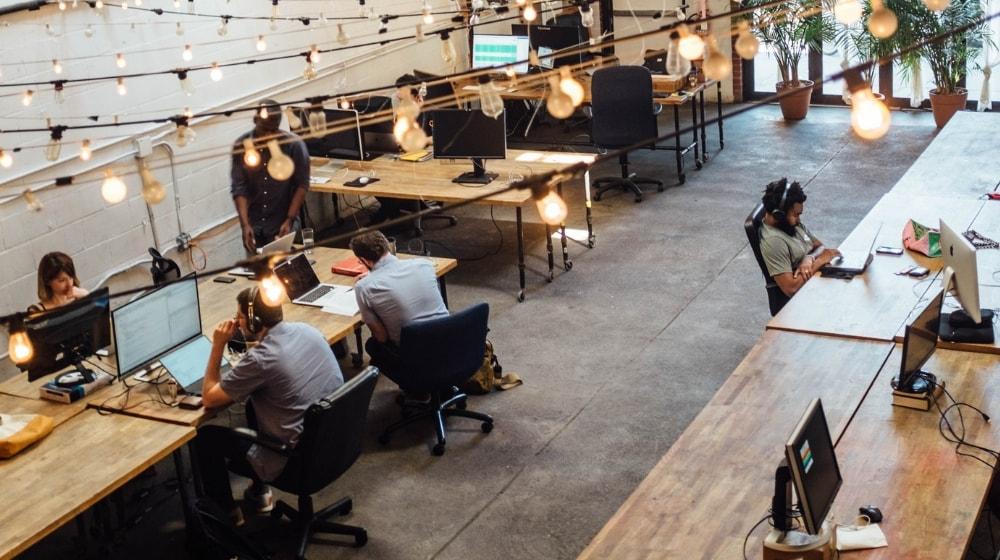There was a time when “garage” was the cool word for startups, thanks to David Packard who rented a house in 1938 in Palo Alto, California. The one-car garage that went with the property became the workshop for Bill Hewlett. Together, the two men founded Hewlett Packard, which is now part of corporate folklore (HP stylishly calls the garage as the birthplace of the Silicon Valley). More than 75 years later, the cool word is no longer “garage” — it’s "coworking" now.
You don't use typewriters anymore. So why should you still stick to the garage?
Hardware is the hot thing now, and software has almost overpowered awesome machines called computers, though it must be remembered that no software can run without some kind of a machine.
Editor’s note: Once you have your office space sorted, put your business online in less than 5 minutes with Online Starter Bundle.
A history of coworking
Software engineer Brad Neuberg is widely credited with starting the first coworking space in San Francisco in 2005 — not far from HP's garage. But as many do, I disagree that this was actually the first instance of coworking.
Though they were not called by the same name, coworking happened earlier in places that some called "hackerspaces" and others called incubators.
Incubators are places where venture capitalists help startups focus on what they do best by providing support and keeping an eye on their teams like mother hens supervising little chicks headed for rooster-hood.
Coworking is a different game.

There is a sophisticated business in renting out plug-and-play offices where anyone can work in teams of one, two, three or hundreds if you will. Entrepreneurs can rent space by the day, week or month.
Unlike the HP garage, the romance of coworking lies not in difficult origins but in a cool ambience. You can have the comforts of a multinational giant such as:
- High-quality Wi-Fi
- Lounging spaces
- Great coffee
Even if you’re a one-person business.
There’s a financial benefit as well, since renting a shared space is considerably cheaper than leasing a work space year-round.
That is not the reason why coworking trumps garage. The real value lies in stuff that includes:
- Mentoring
- Fund-raising
- Networking
- Above all, what you call serendipity
Some coworking businesses guide or otherwise hold the hands of startups by organizing sessions with investors, mentors or service providers. If coworking spaces are pizzas, these services are like toppings that make them better. The best part, however, is serendipity, defined as "the occurrence and development of events by chance in a happy or beneficial way."
![Coworking Two People Talking]](https://www.godaddy.com/resources/in/wp-content/uploads//coworking-two-people-talking-min.jpg)
Coworking companies increasingly do what VCs used to do through incubators.
Coworking turns chance into choice by bringing in a wide range of people you may bump into. They can be good at anything: they may become your customers, offer you sales leads or come up with contacts or ideas that help you with funding, scaling or simply thinking better or smarter.
The magic of the shared workspace
Let's put it all together in a simple expression: the Community Effect.
Big companies are often called successful for what is called the "watercooler effect." This is when loads of employees who are committed and passionate, even if they are from different departments, meet coworkers near water stations and exchange ideas, thoughts or suggestions.
A study at Harvard Medical School found that chatting around the water cooler may go beyond office gossip and even help scientists do better research.

The Community Effect in coworking spaces kind of creates a watercooler effect for startups, which used to be a privilege only for large companies such as an IBM or a Microsoft.
So why not have the best of both worlds?
In fact, make it three worlds. Coworking may be scaling new heights because it offers:
- An easy way to grow; you simply rent more seats as your business expands
- Affordability — you pay less than you would on leasing office or workshop space
- Flexibility, since you can combine working out of home and work at the office when needed
This is a bit like fixing your own drink instead of buying a standard cola can.
I am writing this out of a coworking place.
The best part is that my space is an “Uber for coworking.” This company allows me on a daily rate to land up at any place close to my meetings, schedules or even mood and start work — like I was just taking a cab.
Now you know why coworking may be to the 21st Century what the garage was to the 20th. You could be anywhere on the planet, as long as there is a fine internet connection. If you’re looking for office space but don’t want to commit to a long-term lease, try a shared workspace. You just might love it.






